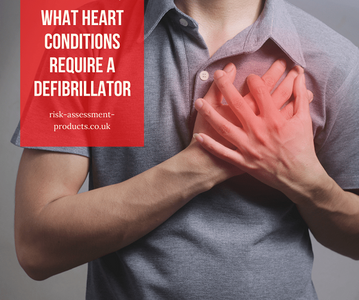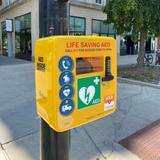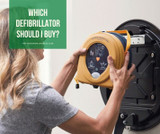What heart conditions require a defibrillator?
There are a range of defibrillators on the market, all of which are designed to save lives when someone falls ill. Defibrillators work by scanning the heart’s rhythm to determine whether a shock is needed and if so, will deliver one. This shock is designed to encourage the heart to resume beating at it’s natural pace.
A number of factors can lead to somebody needing a defibrillator with the most common cause being that somebody has suffered a sudden cardiac arrest (SCA). Cardiac arrests are caused due to an electrical problem with the heart and can happen to anybody at any time. Not targeting a specific gender, age or ethnicity, a cardiac arrest can occur out of the blue. If you are overweight or adopt more unhealthy life choices, your chance of suffering a SCA do increase however, ultimately they are really hard to predict.
It is for this reason why it’s really important to have as many defibrillators installed in public spaces, buildings and businesses so that should anybody fall ill, a defibrillator is always close enough by to help save a life.
A number of other heart conditions may also mean that it is best to obtain a defibrillator. Conditions that mean your heart rate is abnormal such as too fast, too slow or irregular can be factors to consider.
Ventricular Tachycardia, Cardiomyopathy, heart failure, Long QT Syndrome and Brugada Syndrome are all examples of heart conditions that could mean you may need a defibrillator
If you have previously suffered a heart attack or sudden cardiac arrest, you are also at a higher risk of having another cardiac arrest. With this, it’s important to think about opting for your own defibrillator for your home or, asking your place of work to consider purchasing one for additional peace of mind.
A range of different heart conditions of course all impact the body in different ways and if you live with one of the conditions mentioned above, it may be a good idea to consider a defibrillator.
An irregular, fast or slow heartbeat can send the body into a sudden cardiac arrest, if this happens, the best way to save a life is through defibrillation. Without this, CPR alone is not enough.
It’s really important to always of course call the emergency services straight away however, without a defibrillator close by the chances of survival are unfortunately slim.
To opt for the best defibrillator for you, take a look online at the ranges available. With automatic and semi-automatic AED’s available for all environments you can narrow down your best option to ensure you know that you can always rely on your defibrillator.
Recent Posts
-
Empowering Communities: The Lifesaving Impact of CPR on Restart a Heart Day
Every year, on and around October 16th, an important event takes place - Restart a Heart Day. This a …16th Oct 2023 -
Which home defibrillator?
80% of all out of hospital cardiac arrests occur at home. Defibrillators are often available in loca …4th Dec 2022 -
Which defibrillator should I buy?
There are many defibrillators available on the market and it can become overwhelming knowing which o …4th Nov 2022




